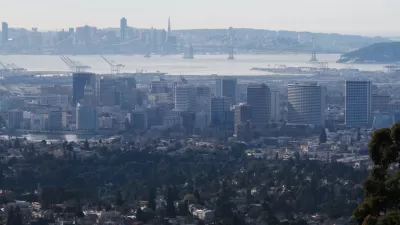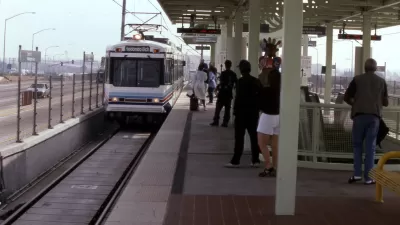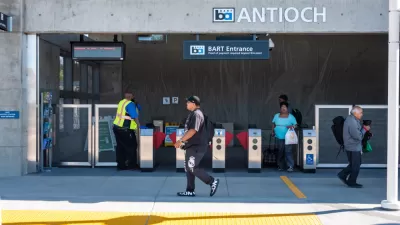The ballot measure generating the most new transportation funds approved by voters this month was in Alameda County, Calif. Voters chose to double an existing sales tax to one percent and extend it to 2045, raising $7.8 billion over 30 years.

While the transit win in Clayton County, Georgia. may have been the most significant, as the Atlanta-area county had "rejected a vote to join (Metropolitan Atlanta Rapid Transit Authority) MARTA back in 1971 and has struggled to provide good mass transit ever since—the latest blow coming in 2010, when a funding shortage forced its local bus system to stop running," as Eric Jaffe of Atlantic's CityLab writes (and also described here).
However, it was hardly the largest revenue producer. According to The Atlanta Journal‑Constitution, passage of the referendum "means Clayton’s sales tax will rise from 7 percent to 8 percent, starting in March. The MARTA tax is expected to generate proceeds of about $45 million per year."
By comparison, Alameda County Measure BB, by my calculation, will generate proceeds that average out to be about $260 million annually through 2045. Many other California counties and cities also passed significant transportation ballot measures on Nov. 4, including San Francisco's $500 million bond measure and MUNI population-based increase amendment, listed here by Melanie Curry of Streetsblog.
The prize for the biggest generator of transportation funds goes to Texas where voters "approved an amendment to increase state transportation spending by $1.2 billion to $1.7 billion a year," writes Governing's transportation reporter, Daniel C. Vock. However, while the funds may be new to the state's highway fund, they are hardly new tax dollars, as they are in Alameda County. Rather, voters authorized shifting the energy tax revenues from the state's rainy day fund, as noted here.
Denis Cuff, transportation reporter for the Contra Costa Times, writes that Measure BB "provides $3.7 billion for public transit and paratransit, $3 billion for road maintenance and freeway improvements, and $1 billion for bike and pedestrian improvements and transit-oriented development."
According to AC Transit, the East Bay public transit provider "will receive approximately $41 million per year in direct funding for bus operations, maintenance and safety, and approximately $9.9 million per year for East Bay Paratransit for seniors and people with disabilities. Measure BB could also fund capital improvements on AC Transit route."
The Bay Area Rapid Transit District (BART), the Bay Area's heavy rail network, received substantially less funding by comparison: $400 million for an extension to Livermore.
The measure, which needed to pass by two-thirds, received 69.56% of the vote. A similar measure barely missed the crucial 66.67% threshold two years earlier.
Another significant transit winner was in Seattle, where voters backed Proposition One that added a one-tenth of one percent sales tax and a $60 "car tab" (registration fee) to prevent (King County) Metro transit from slashing bus routes serving Seattle. Metro routes outside the city may still see cuts as county voters had rejected a bus funding measure in xxx, prompting Seattle Mayor Ed Murray and the Seattle City Council to act.
FULL STORY: Alameda County prepares to spend billions from increased sales tax

Planetizen Federal Action Tracker
A weekly monitor of how Trump’s orders and actions are impacting planners and planning in America.

Restaurant Patios Were a Pandemic Win — Why Were They so Hard to Keep?
Social distancing requirements and changes in travel patterns prompted cities to pilot new uses for street and sidewalk space. Then it got complicated.

Map: Where Senate Republicans Want to Sell Your Public Lands
For public land advocates, the Senate Republicans’ proposal to sell millions of acres of public land in the West is “the biggest fight of their careers.”

Maui's Vacation Rental Debate Turns Ugly
Verbal attacks, misinformation campaigns and fistfights plague a high-stakes debate to convert thousands of vacation rentals into long-term housing.

San Francisco Suspends Traffic Calming Amidst Record Deaths
Citing “a challenging fiscal landscape,” the city will cease the program on the heels of 42 traffic deaths, including 24 pedestrians.

California Homeless Arrests, Citations Spike After Ruling
An investigation reveals that anti-homeless actions increased up to 500% after Grants Pass v. Johnson — even in cities claiming no policy change.
Urban Design for Planners 1: Software Tools
This six-course series explores essential urban design concepts using open source software and equips planners with the tools they need to participate fully in the urban design process.
Planning for Universal Design
Learn the tools for implementing Universal Design in planning regulations.
Heyer Gruel & Associates PA
JM Goldson LLC
Custer County Colorado
City of Camden Redevelopment Agency
City of Astoria
Transportation Research & Education Center (TREC) at Portland State University
Camden Redevelopment Agency
City of Claremont
Municipality of Princeton (NJ)





























